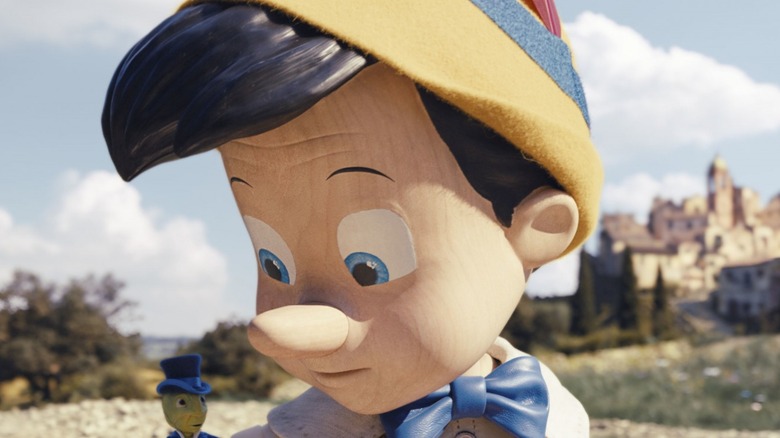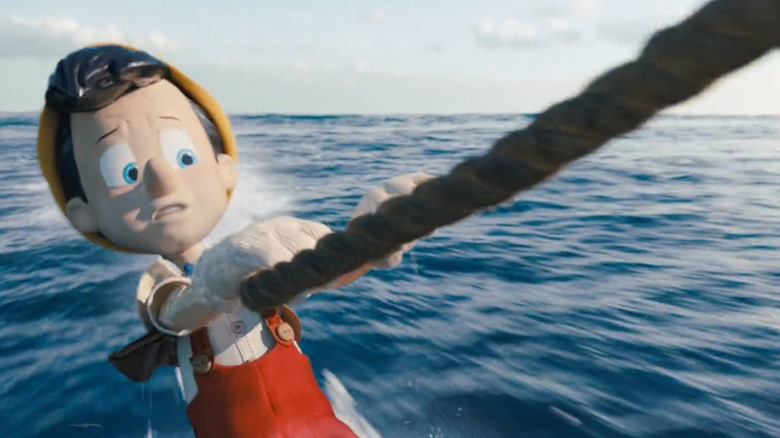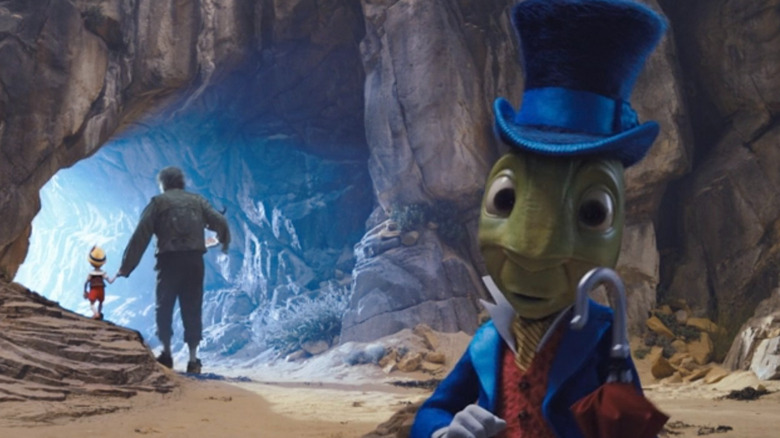It's Time To Talk About That Major Change To The Ending In Disney's Live-Action Pinocchio
Contains spoilers for "Pinocchio"
Like many of Disney's live-action remakes of its animated films, for the most part, the 2022 live-action "Pinocchio" is a scene-by-scene retread of 1940's animated "Pinocchio." However, in its final act, it breaks from routine and plays around with what many might deem the biggest part of the story: its ending.
Cast your mind back to the all-singing, all-dancing, and slightly nightmarish version with kids turning into donkeys (equally unnerving here), and you'll recall that Pinocchio (Dickie Jones) bravely dies in an attempt to save his father, Geppetto (Christian Rub). The Blue Fairy (Evelyn Venable) deems his act of heroism worthy enough for him to be turned into a human boy as he had always hoped. In the live-action version, however, the kid with no strings performs a similarly noble act that doesn't cost him his life, leading to a very different outcome that is noticeably absent in fairy involvement.
Pinocchio's transformation is left to interpretation ... kind of
After Pinocchio (Benjamin Evan Ainsworth) saves his father, Geppetto (Tom Hanks), from Monstro, the latter gives his son assurance that while he may be made of pine, he will always see him as a real boy, no matter what anyone else might say. While it's a drastic alteration from both the 1940 film and the book by Carlo Collodi both are inspired by, it's an interesting creative choice that the minds behind it thought very carefully about.
As Robert Zemeckis explained in the film's press kit, "It makes the story more personal to the viewer, so that everyone can go on Pinocchio's journey in a way that is pure in the sense that we're not telling the audience what they have to feel or what they have to think."
It's a step in the story that the film's co-writer, Chris Weitz, also stood by. "He is real in that he has learned his lessons and grown a conscience, but there is no need for him to end up a certain way physically for him to prove that," he explained. "Geppetto has gone on a journey himself and realizes that Pinocchio is a person in his own right and is as 'real' to him as any flesh-and-blood boy." It's a brave diversion to apply to such a beloved story, but while the intention is there, the handling of it is something that may have some viewers questioning.
Jiminy Cricket's conclusion complicates the new ending for Pinocchio
While Robert Zemeckis and Chris Weitz attempted to deliver their message with the best intention, particularly in a society where identity means far more than it did over 80 years ago, the final note isn't as strong as it could be. As both Pinocchio and Geppetto wander off into the light, we're left with Jiminy Cricket (Joseph Gordon-Levitt) speaking directly to the camera in the film's final few lines. "So in the end, Pinocchio did prove himself brave, honest, and unselfish," the conscience recalls, adding, "And since then, many stories have been told about him. People say he was transformed into an honest-to-goodness real boy. Did that actually happen? Who knows. But I do know one thing for sure. In his heart, Pinocchio is as real as any real boy could ever be." Except you do know, don't you, Jiminy? Since we're seeing it happen right there at that very second.
His back to the camera, Pinocchio's wooden joints begin to transform into skin, proving that we don't need an "interpretation" since it's shown happening. With that in mind, it begs the question of why it was even included since it undercuts whatever statement the film's finale was trying to convey. Might it have been better to leave Pinocchio be? Judge for yourself. "Pinocchio" is available now on Disney+.


